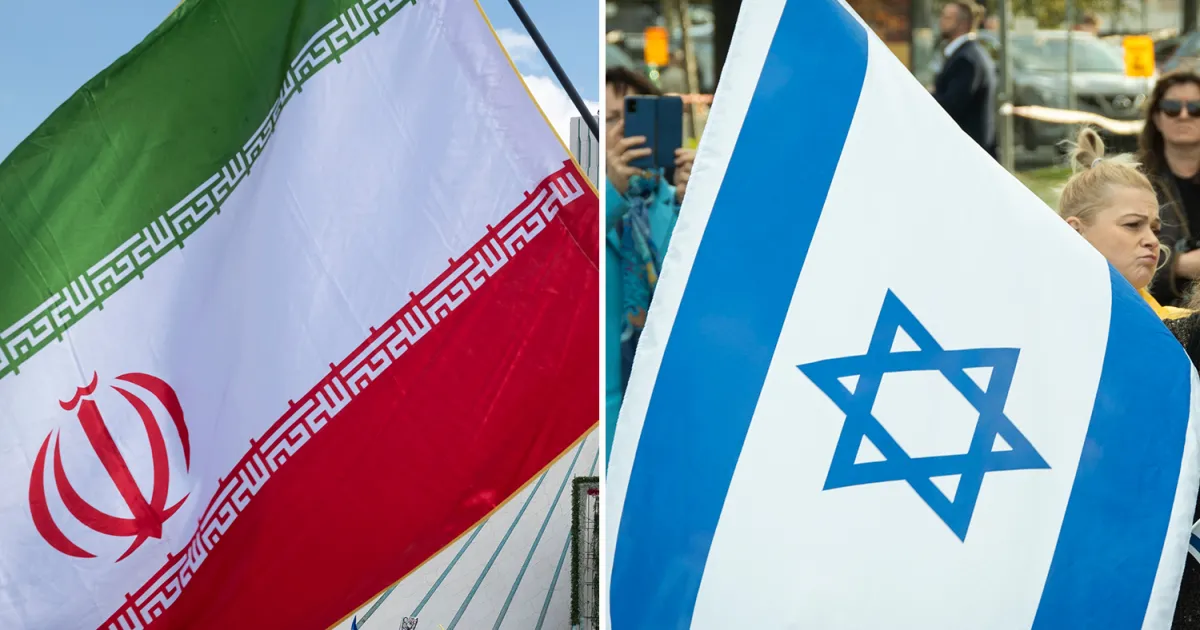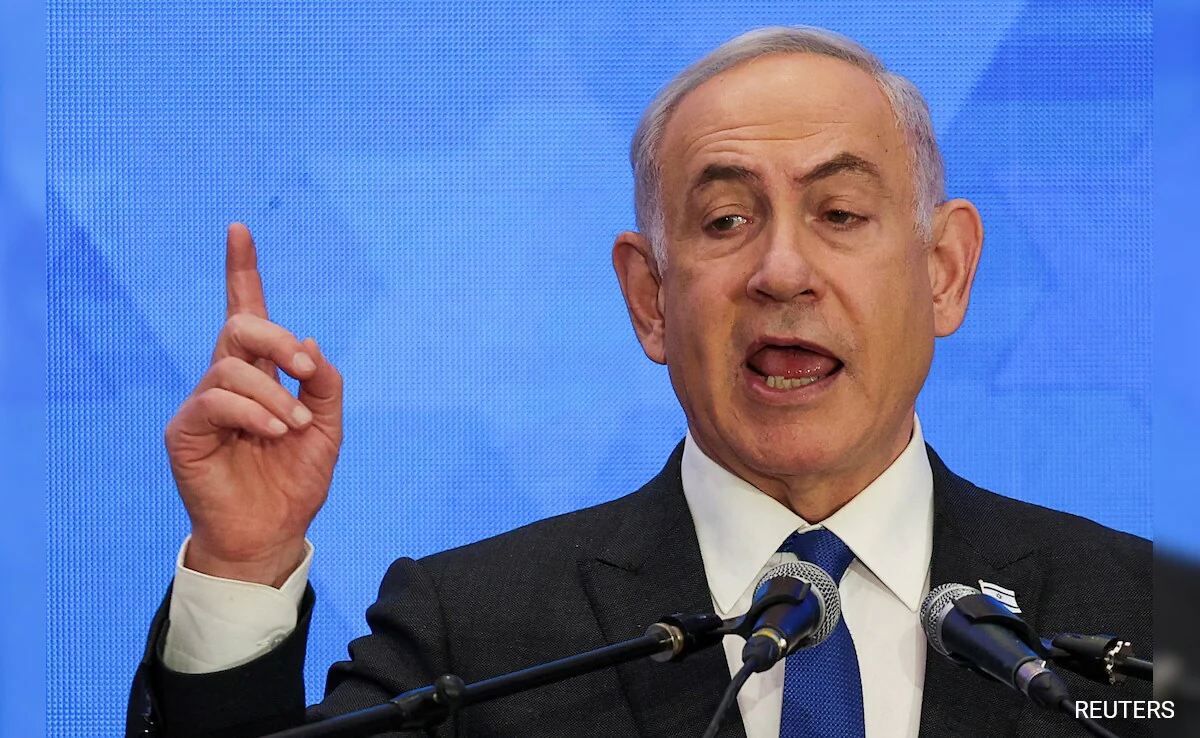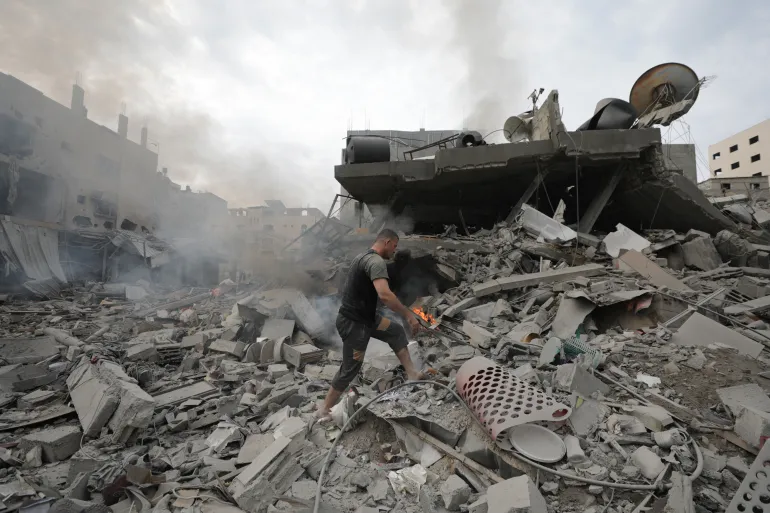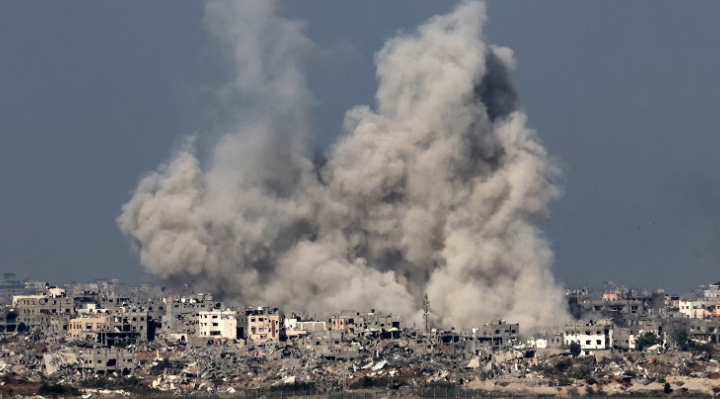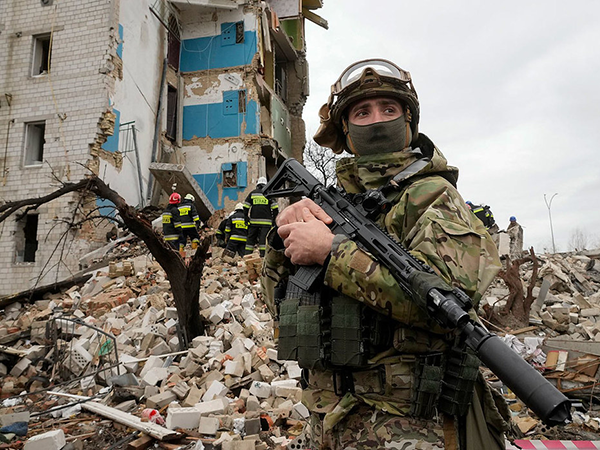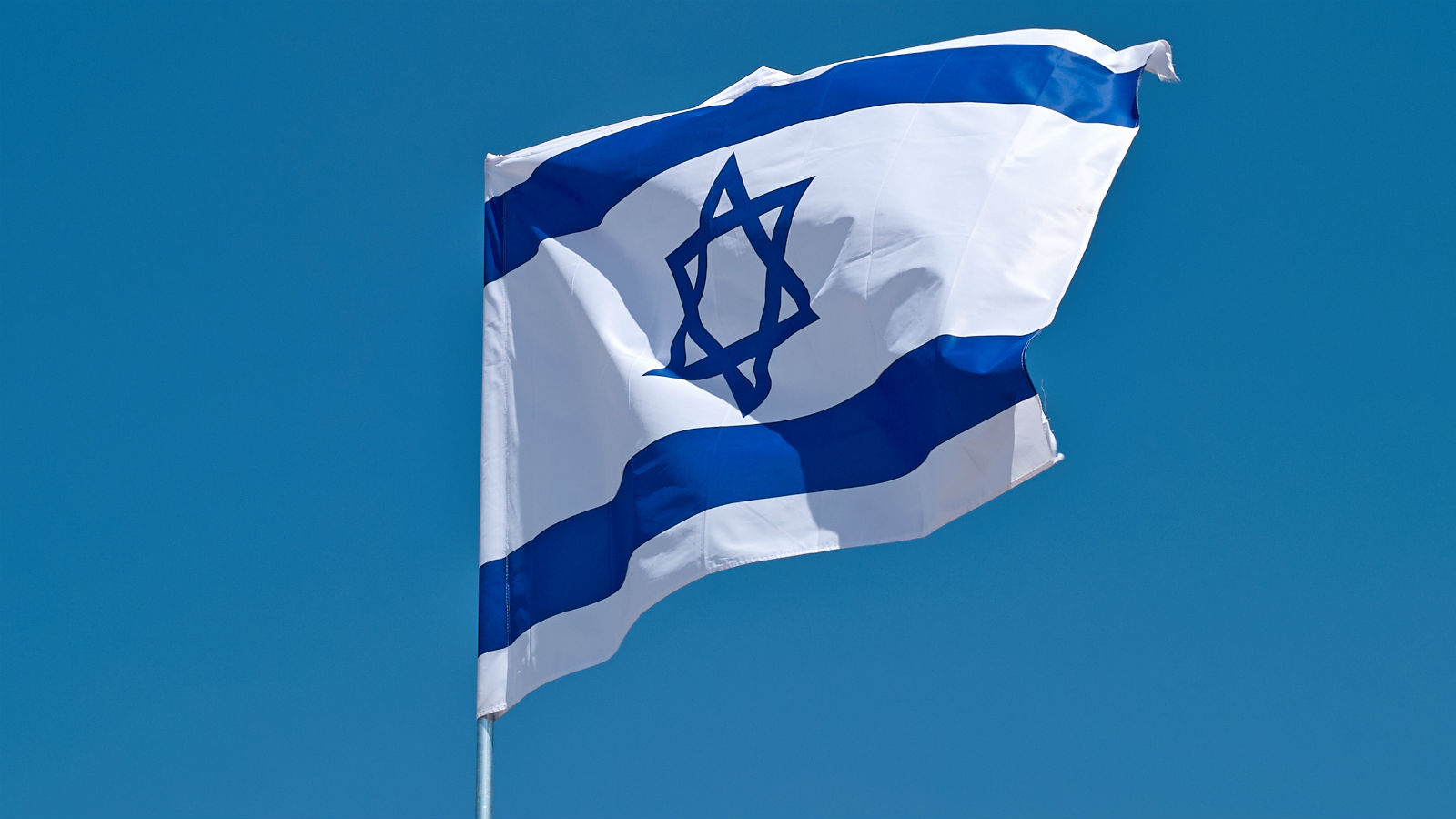“God is the Greatest!” chanted a crowd of traumatized Palestinian youths in the war-torn Gaza city of Khan Younis as they made futile efforts to dig through a pile of rubble with their bare hands in a bid to rescue their fellow men, women, and children trapped under it, following an Israeli Defense Forces (IDF) bombing operation that had reduced a cluster of residential buildings to smouldering ruins, on New Year Day afternoon. “Death to Israel!” shouted others watching the billows of thick black smoke that was enveloping their devastated neighbourhood, where residential structures, hospitals, and schools had become targets of the IDF’s retaliatory military campaign against Hamas, following the militant organization’s October 7, 2023 cross-border operation that saw the slaughter of about 1300 Israeli citizens and the seizure of another 240 as hostages.
“We are at war,” declared Prime Minister Banjamin Netanyahu in a national address on that fateful day of October 7th as graphic details of Hamas’s unpardonable atrocities, including the decapitation of children and disembowelment of women, began to emerge. “The enemy will pay an unprecedented price,” continued the embattled prime minister as he vowed to “return fire of a magnitude that the enemy has not known.” His defense minister, Yoav Gallant, went a bit further: “We will wipe this thing called Hamas off the face of the earth. It will cease to exist.” Thus began Israel’s ongoing aerial bombardment and ground assault as it seeks to annihilate Hamas and dismantle its terrorist infrastructure in Gaza.
“If God is the Greatest, as these war-scarred Palestinians maintain even in the face of death and destruction, why did he not decisively prevent the outbreak of this war between Israel and Hamas?” asked a friend as both of us watched the unfolding television images. “Why would an all-knowing God fail to forewarn the leadership of Hamas on the consequences of its planned terrorist operation against Israel?” he continued, and then added: “How come Israeli, for all its security-obsession, did not even obtain some sort of divinely inspired leaks about Hamas’ operation that was reportedly planned over a period of not less than two years?”
“The ways of God are unknowable and fathomless; you cannot question him,” I responded to my friend, drawing on the self-abnegating explanations one often hears from credulous religious adherents caught up in similar arguments. My friend wasn’t fooled. He simply laughed off my response, knowing too well that I too doubted its plausibility, and then retorted sarcastically: “Since you believe that God cannot be questioned, please tell him to stop the ongoing bloodshed in Gaza, and the unending cycle of violence between the state of Israel and the stateless Palestinians, so that we will know that he is truly the greatest.”
Were the bitter truth to be told, most people across the globe entertain similar thoughts in relation to God’s ineffectual role, not only in the ongoing war in Gaza, but in relation to other devastating conflicts bedeviling the world, like the unending fratricidal wars in Somalia, Libya, Sudan, South Sudan, DRC, CAR, etc.; the brutal and bruising Russo-Ukraine War precipitated by President Putin’s ultra-nationalism and irridentism; the Yemeni civil war occasioned by Iranian-Saudi regional geopolitical rivalry; the Myanmar civil war involving genocidal persecution of the Rohingya Muslim population by the country’s ruling junta; the ethno-religious strife plaguing several Afro-Asian countries like Nigeria, Mali, Pakistan, and India; the murderous gangsterism threatening the fabrics of society in Latin American and Caribbean countries like Ecuador, Honduras, Colombia, and Haiti.
As a matter of fact, doubts relating to God’s ability to prevent the occurrence of violent conflicts across the world are neither new nor strange. The history of humanity is replete with ontological questions concerning the existence of an all-powerful God that permits evil occurrences, such as war. In what is generally known as the “Problem of Evil,” the existence of a universally powerful and influential God has been subjected to a myriad of disputations, largely on the ground that by the nature of such a divine being, he ought to be able to forestall the occurrence of evil in the world. At the heart of this age-long controversy is the “Riddle of Epicurus” or “Epicurean Paradox.”
An ancient Greek philosopher, Epicurus (341 – 270 BCE) presented his riddle in the following summarized form: “If God is omnipotent, omnipresent, and omniscient, why is there evil in the world.” Generations of philosophers and theologians have attempted to resolve the riddle with explanations bordering on intellectual sophistry. Evil is a “necessity” in the world, some opine, while others assert that evil is an “illusion,” which does not exist. Evil occurs so that the “greater good” can be realized, many argue, even as others maintain that the human being has been divinely imbued with the “free will” to make his/her own decisions.
Suffice to say that the Epicurean Riddle has remained unresolved till this day, since each philosophical or theological explanation throws up further posers that serve to negate the omnipotent, omnipresent, and omniscient attributes of God, as encapsulated in the following argument of Epicurus: “Is God willing to prevent evil, but not able? then he is impotent; Is he able, but not willing? then he is malevolent; Is he both able and willing? then why is there evil?” In any case, a plethora of empirical studies exists in the corpus of literature that abounds on the subject. Hence, it would be unnecessary to further belabour it, here. However, it must be emphasized that of all the evils abounding in the world, that of war is the most savage, cruel, brutal, barbaric, destructive, and bloody.
Civil or international, war entails the visitation of death, destruction, and misery upon its victims, especially the vulnerable segments of the population that include women, children, the elderly, and the infirm. Even as the “Geneva Conventions of 1949” and the related “Protocols of 1977 and 2005” have sought to humanize the conduct of war, anything still goes in a war situation. Criminal-minded combatants and base elements perpetrate unimaginable atrocities, including rape and torture of women, who are often sexually enslaved. In August 2014, in the Sinjar Province of Northern Iraq, Islamic State in Iraq and Syria (ISIS) militants treated the Yazidi women like spoils of war and sold most of them off into slavery, having raped many to death.
It is rather unfortunate that some people still hold on to the outmoded theory of the 19th Century military strategist, Carl von Clausewitz, which states that “War is a continuation of politics by other means.” Suffice to say that during his time, war simply entailed the deployment of calvary soldiers armed with Dane guns or muzzle-loading rifles fitted with bayonets (long knives). Absent were the destructive weapons and ammunitions of present-day warfare: battle tanks, artillery batteries, jetfighters and bombers, drones, nuclear-powered warships and submarines, supersonic and hypersonic missiles, etc.
The American Civil War hero, General William Tecumseh Sherman, famously decried war as “hell” on earth, noting that its success is usually “over dead and mangled bodies, with the anguish and lamentations of distant families.” While admonishing the graduating students of a military academy against militarism and warmongering, he stated: “It’s entirely natural that there should beat in the breast of every one of you a hope and desire that someday you can use the skill you have acquired here. Suppress it! You don’t know the horrible aspects of war. I’ve been through two wars, and I know. I’ve seen cities and homes in ashes. I’ve seen thousands of men lying on the ground, their dead faces looking up at the skies. I tell you; war is hell!”
The hellish nature of war is being reenacted in the ongoing Israeli blitzkrieg in Gaza as waves of bombers and missiles thunder into the beleaguered territory, leaving a trail of death, destruction, and heartrending misery in their wake. Entire streets and neighbourhoods in the densely populated enclave have been reduced to rubble and smouldering ruins. Expectedly, women and children comprise a substantial number of the present estimate of 25,000 dead and 60,000 wounded, according to the Hamas-run health ministry, prompting calls for a humanitarian ceasefire by most countries, including the US, Britain, and France – Israel’s staunch allies.
The palpable misery of the Palestinians in Gaza is fast aligning international public opinion in their favour, while Israel’s casus belli of Hamas’ October 7th massacre is receding into the background, even as the Jewish state strategically avoids escalating the war into a regional affair amidst hostilities from pro-Hamas militant organizations, like the Hezbollah of Lebanon and the Houthis of Yemen. Backed by Iran, the alleged sponsor of Hamas’ October 7th operation, the Hezbollah and Houthis have been testing Israel’s resolve, with the US and Britain intervening sporadically to check the Houthis, who are already embroiled in the lingering Yemeni civil war.
In what can be likened to an exercise in international political grandstanding, South Africa filed a case with the International Court of Justice (ICJ) in December 2023, alleging that Israel is engaging in “genocidal acts” in Gaza. Expectedly, Israel rejected the allegation, calling it “baseless.” Of course, the South African government is cognizant of the fact that in theory, the rulings of the ICJ are legally binding on disputing parties, but in practice, they are unenforceable, as some past rulings of the court have shown. In March 2022, the ICJ ruled that Russia immediately suspend all military operations in Ukraine,” but the ruling was disregarded by the aggressor.
With benefit of hindsight, the South African legal action against Israel is most ironical. In June 2015, the ANC-led government of South Africa thwarted the efforts of the International Criminal Court (ICC) to arrest Sudanese President Omar al-Bashir as he attended the African Union (AU) Summit held in Pretoria – South Africa. Al-Bashir had been indicted by the ICC, twice in 2009 and 2010, for committing war crimes, crimes against humanity, ethnic cleansing, and acts of genocide against the black-skinned people of Darfur in Sudan. A South African High Court Judge declared the government’s failure to arrest him as a “disgraceful conduct.”
In an article titled “Sudanese Civil War: When Riders End Up in The Belly of Their Tigers,” published in The News Guru at the outbreak of the Sudanese Civil War in April 2023, Yours Sincerely argued that if the ICC was successful in arresting and prosecuting al-Bashir, there is a high probability that both General Mohammed Hamdan Dagalo aka Hemedti and General Abdel Fattah al-Burhan would also have been indicted for their complicity in his crimes, and the ongoing war in Sudan that was occasioned by a power-struggle between both men, would certainly not have occurred.
Alas, the world’s attention is presently riveted on the wars in Ukraine and Gaza, while the ongoing bloodbath in Sudan has been largely forgotten, even as General Hemedti’s Rapid Support Forces (RSF) embark on the mass-slaughter of the black-skinned people of the Fur, Masalit and Zaghawa ethnic groups in Darfur, in a manner akin to the 2003 – 2006 ethnic cleansing and genocidal campaigns that occasioned the ICC’s indictment of then President Omar al-Bashir. “The more things change, the more they stay the same,” goes a popular saying.
War is an evil phenomenon in all its ramification, but its outbreak is not always inevitable. Whenever peaceful diplomacy is allowed to prevail, war is usually averted as witnessed in the Cuban Missile Crisis of 1962 – a conflict that could have precipitated an apocalyptic nuclear conflagration. In his “Canterbury Tales,” the 14th Century English Poet, Geofrey Chaucer, had this to say about war: “Many a man cries ‘War, war!’ who knows very little what war amounts to. War at its beginning has so large an entrance that anyone may enter when he likes and find war easily; the end, though, is certainly not easy to know … Before they start a war, men must therefore have great counsel and deliberation.”
Thus, humanity’s overriding necessity to avert any looming war must never be left to the imaginary intervention of any so-called divine forces. “Heaven helps those who help themselves,” goes a popular saying. In a bid to stem and eradicate the evil tide of war, humanity must wholeheartedly embrace peaceful diplomacy based on roundtable negotiations that never seem to fail when genuinely pursued by all contending parties in a conflict.
Dennis Onakinor writes from Lagos – Nigeria, and can be reached via e-mail at dennisonakinor@yahoo.com
